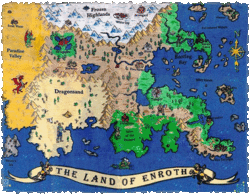RPG Codex Review: Unrest
RPG Codex Review: Unrest
Review - posted by Crooked Bee on Sat 26 July 2014, 11:04:33
Tags: Pyrodactyl Games; UnrestUnrest is the Kickstarted adventure RPG set in a fantasy version of ancient India, developed by Pyrodactyl Games and released just a couple of days ago on Steam and GOG. In this review, esteemed community members Deuce Traveler and VioletShadow tell you about the experience they've had with the game - what they have, and haven't, enjoyed about it.
Have a snippet:
Read the full review: RPG Codex Review: Unrest
Have a snippet:
VioletShadow: The concept of seeing the Bhimra's unrest through the eyes of several different main characters worked very well. Not only were the individual segments intertwined in terms of their actions and consequences, but the personal perspective of each of them served to ground the world and make it feel very lived-in. Some of my favorite segments were the ones that involved the peasant. Even though she was only loosely connected to the main plot, her story and the circumstances she found herself in helped illustrate the disconnect between the lower castes and those at the top. Her immediate preoccupations, and those of the other peasants, involved problems directly related to their status in society, such as lack of food and the need to marry into higher castes, rather than political instability or the trade treaty, which for the most part they hadn't even heard of. It made me think of how the isolation of the lower castes created the conditions for problems such as the slums' rioting. This ties into your point regarding events outside the characters' control. Looking back to the segment with the naga, I felt a strong sense of helplessness; there was really nothing she could do to make the situation better. I agree that it made the game world believable, and a much more immersive experience than if some chosen one could erase history and its consequences with eye-rolling heroics.
Deuce Traveler: The world of Unrest is certainly a kind of medieval fantasy setting, but different enough to interest players tired of the all-too-familiar pseudo-European fare. The architecture is eastern, as is the dress of the people. The culture is post-Gupta Indian, featuring an entrenched caste system and Hinduism with nary a hint of Buddhism or Islam. The game's story fleshes out the motivations of its various characters, including the villains, who believe that they were right for making the bloody decisions that propel the plot, despite the catastrophic results. This is not a story of noble heroes pushing back darkness, but instead a tale of survivors with opposing viewpoints going through their lives, which are interrupted on occasion by short outbursts of charity or wickedness.
[...] Finally, there are some major decisions you can make in the game that seem to have little effect on the overall story. In one playthrough, I decided that I was going to put my character in harm's way for the sake of diplomatic niceties. That character was killed. On the second playthrough I decided to be especially conceding during the diplomatic discussions, but then rigidly refused a request for my character to put himself in harm's way. This caused my character to step down from her diplomatic station and retire. In the character's narrative this made a huge difference, since she was now alive rather than dead. But from my perspective as a player the result was the same, since the character would have no further impact on how the story unfolded.
Deuce Traveler: The world of Unrest is certainly a kind of medieval fantasy setting, but different enough to interest players tired of the all-too-familiar pseudo-European fare. The architecture is eastern, as is the dress of the people. The culture is post-Gupta Indian, featuring an entrenched caste system and Hinduism with nary a hint of Buddhism or Islam. The game's story fleshes out the motivations of its various characters, including the villains, who believe that they were right for making the bloody decisions that propel the plot, despite the catastrophic results. This is not a story of noble heroes pushing back darkness, but instead a tale of survivors with opposing viewpoints going through their lives, which are interrupted on occasion by short outbursts of charity or wickedness.
[...] Finally, there are some major decisions you can make in the game that seem to have little effect on the overall story. In one playthrough, I decided that I was going to put my character in harm's way for the sake of diplomatic niceties. That character was killed. On the second playthrough I decided to be especially conceding during the diplomatic discussions, but then rigidly refused a request for my character to put himself in harm's way. This caused my character to step down from her diplomatic station and retire. In the character's narrative this made a huge difference, since she was now alive rather than dead. But from my perspective as a player the result was the same, since the character would have no further impact on how the story unfolded.
Read the full review: RPG Codex Review: Unrest
[Review by Deuce Traveler and VioletShadow; edited by Infinitron]
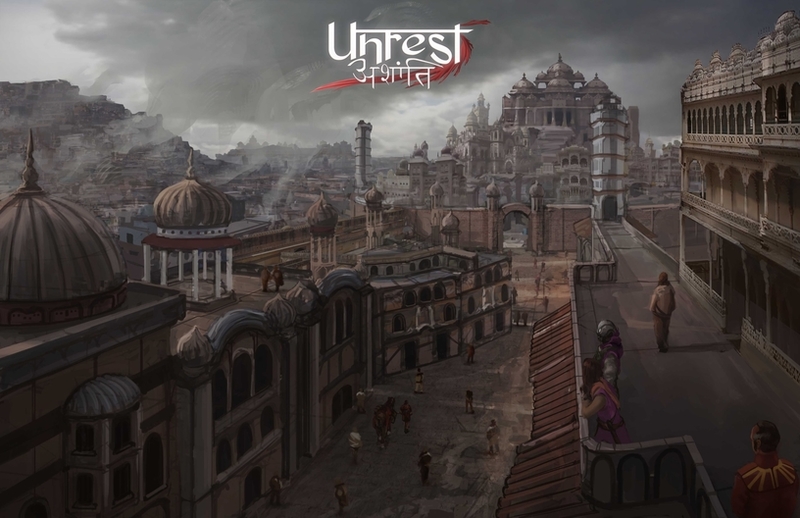
Deuce Traveler: Unrest is an indie adventure game, labelled by its creators as an "adventure RPG", and available on Steam and GOG. It was Kickstarted last year by Pyrodactyl Games, a small developer led by programmer Arvind Raja Yadav. Prior to this game, Mr. Yadav also spearheaded the creation of two other small indie games: Will Fight for Food and The A.Typical RPG. The story of Unrest is based on Indian history and myth, focusing on fictional events surrounding the fate of the city of Bhimra. Something I found out while researching the game is that there actually is an Indian city of Bhimra, so in some ways fact meets fiction in this adventure.
Story
The city of Bhimra has been suffering a continuous drought for years. The drought has destroyed the local economy, resulting in a large urban population unable to feed itself. Although the majority of the population in the city and its surrounding areas have been able to make do despite tightened belts, many people have lost everything, retreating into the city's already burgeoning slums. Because of this, the royal family has decided to sign a treaty with the distrusted naga race. The king and queen have agreed to allow an influx of naga immigration into the city in return for agricultural trade which will feed its hungry population. The unemployed people of the slums are violently opposed to this idea, as bringing in foreigners in will worsen their unemployment. The human merchants are also opposed to the treaty, since they will lose their monopoly on the food market. Riots erupt, causing increased animosity between the people of the slums, the better off citizens of Bhimra, and the newly arrived naga.
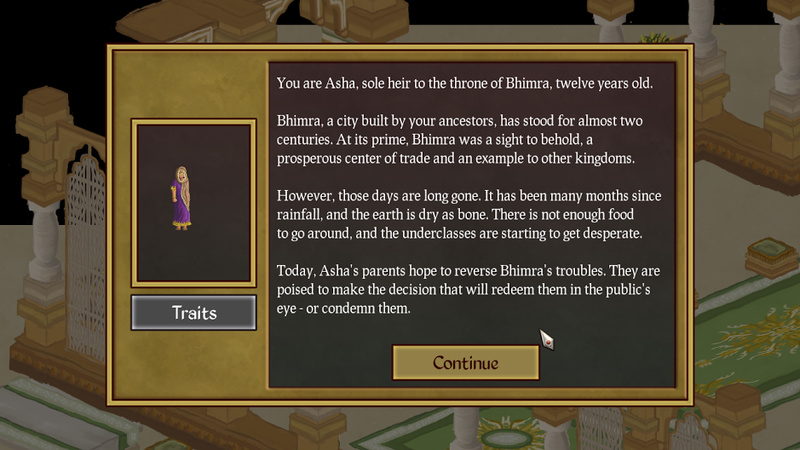
The game begins with you playing as the naïve princess of Bhimra and becoming familiar with the internal politics of the game world. However, the storyline is actually divided into several segments, with a different protagonist coming to the fore with each transition. As the story progresses, you will view the unrest of Bhimra through the eyes of the princess, a naga, a peasant, a priest, and a warrior, whose personalities are fleshed out via appropriate dialogue options. It's important to note that many of the game's events are going to happen regardless of the characters' actions. For instance, nothing the characters can do will stop the angry rioting of the hungry, or the drought that is destroying the economy. The best the player can do is try to steer events towards a favorable outcome. I very much like this aspect of the game, as you quickly learn that you cannot solve the problems you face with the swing of a weapon or the casting of a spell. You will often find yourself feeling helpless in the face of events beyond your control, and that vulnerability translates into how you approach other in-game characters.
VioletShadow: The concept of seeing the Bhimra's unrest through the eyes of several different main characters worked very well. Not only were the individual segments intertwined in terms of their actions and consequences, but the personal perspective of each of them served to ground the world and make it feel very lived-in. Some of my favorite segments were the ones that involved the peasant. Even though she was only loosely connected to the main plot, her story and the circumstances she found herself in helped illustrate the disconnect between the lower castes and those at the top. Her immediate preoccupations, and those of the other peasants, involved problems directly related to their status in society, such as lack of food and the need to marry into higher castes, rather than political instability or the trade treaty, which for the most part they hadn't even heard of. It made me think of how the isolation of the lower castes created the conditions for problems such as the slums' rioting. This ties into your point regarding events outside the characters' control. Looking back to the segment with the naga, I felt a strong sense of helplessness; there was really nothing she could do to make the situation better. I agree that it made the game world believable, and a much more immersive experience than if some chosen one could erase history and its consequences with eye-rolling heroics.
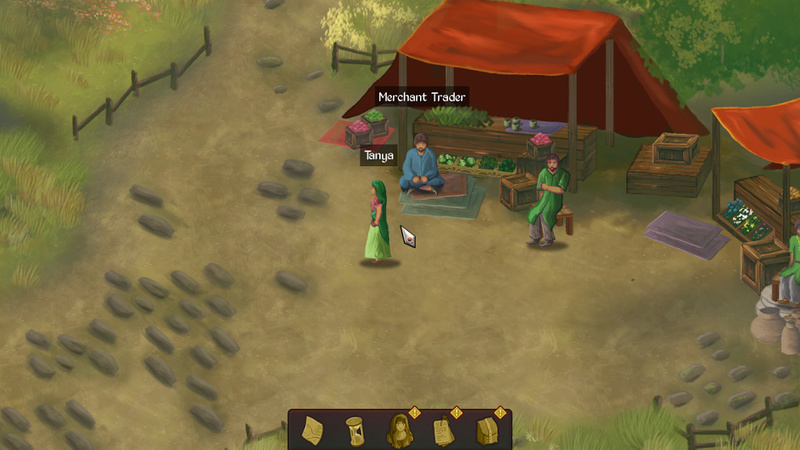
Deuce Traveler: The world of Unrest is certainly a kind of medieval fantasy setting, but different enough to interest players tired of the all-too-familiar pseudo-European fare. The architecture is eastern, as is the dress of the people. The culture is post-Gupta Indian, featuring an entrenched caste system and Hinduism with nary a hint of Buddhism or Islam. The game's story fleshes out the motivations of its various characters, including the villains, who believe that they were right for making the bloody decisions that propel the plot, despite the catastrophic results. This is not a story of noble heroes pushing back darkness, but instead a tale of survivors with opposing viewpoints going through their lives, which are interrupted on occasion by short outbursts of charity or wickedness.
VioletShadow: This is definitively a tale of "playing the hand you are dealt", which should be enjoyable to players who have grown tired of going through games as either idealistic simpletons or mass-murdering maniacs. As Deuce mentions, even villains and antagonists have believable reasons for the things they do, and players might even find themselves sympathizing with some of them. Unrest is about survival in many ways, and I enjoyed how no matter which path you have your character take, that theme will always be illustrated throughout the game.
Gameplay
Deuce Traveler: Right off the bat, you have two difficulty options to choose from: Myth and Mortal. Myth mode is considered easier since it allows you to use multiple save slots. Mortal is considered an "Iron Man" mode, because it limits you to one save. Other than that, there is little difference between the two, and you can still save scum in Mortal mode with the one save slot. All things considered, the designer should have saved himself some time, dropped the idea of difficulty levels, and put his efforts into lengthening the game instead.
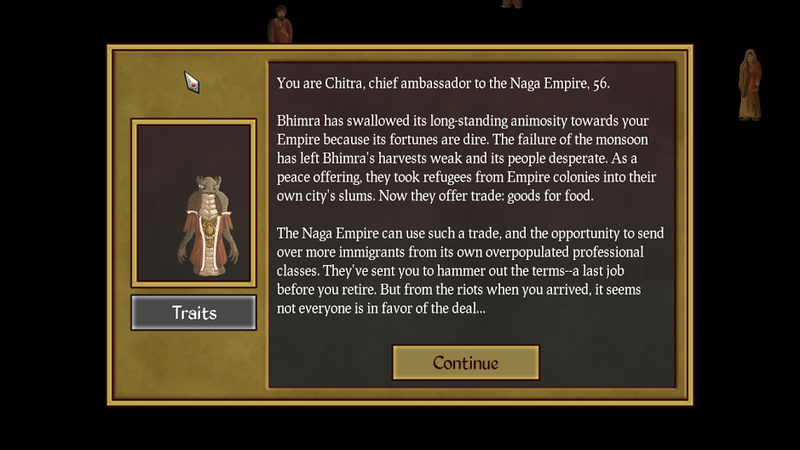
There is no character creation, no skill trees, no ability scores, and no leveling system. You do play character roles, and the discussions you have with others can take you down different paths of the story. In my opinion, this does not make the game an RPG, any more than the branching conversation paths of Wing Commander III and IV make those games RPGs. I would call Unrest a fantasy relationship simulator. The objective is to walk from point to point, talk to people and sway them into aiding you. The maps are small, so backtracking isn't painful, although I did notice that my character inexplicably walked slower on some surfaces, such as rugs.
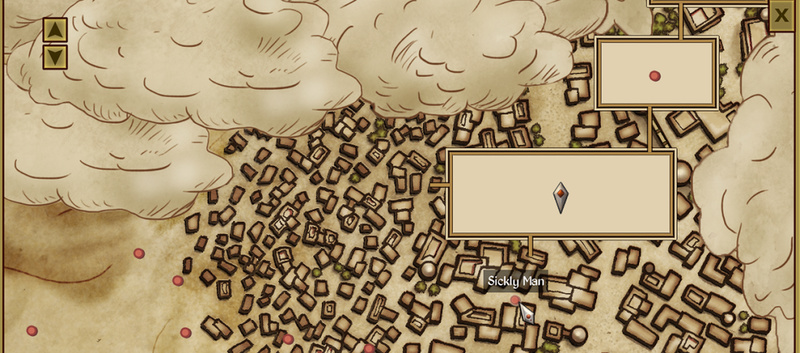
When you enter into dialogue with another person you will see three different meters. The first is a green friendship meter, which shows whether that person is hostile or friendly. The second meter is blue, and indicates how much respect the person has for the protagonist. The third meter is red and indicates fear. You can use dialogue to change how people perceive your character, from alienating people who might be friends, to talking down someone who intended to attack. You can fail at a conversation, which will permanently lock you out of its dialogue trees. In one part of the game I was helping out a naga, but I accidentally offended him and therefore he would not aid my character in her attempt to escape her village. A successful conversation can sway someone to your side, while a failed conversation can lead to violence. This won't matter much in the beginning of the game when everyone is on friendly terms, but you will want to choose your words carefully when the inevitable feces strikes the twirling rotary blades.
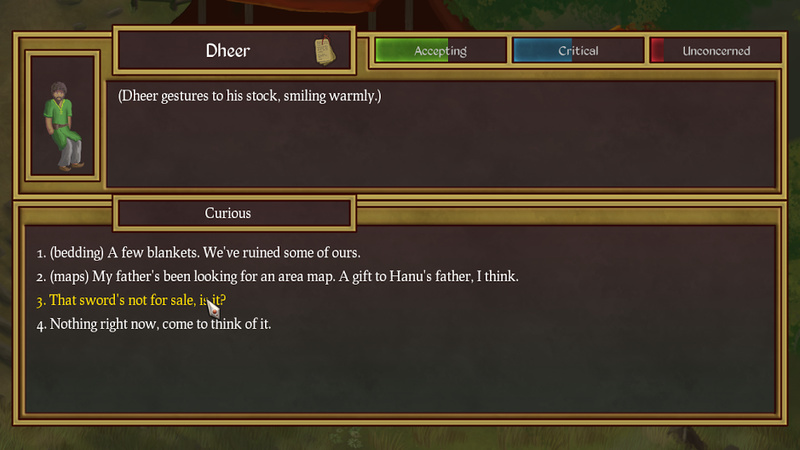
When conversations do go bad, the player will find his character in combat on a two dimensional field, standing opposite his or her enemy. Fighting is a simplified affair with two buttons that allow striking and blocking. Each side has several "damage tokens" that represent a hit points system. A successful strike results in the character hit losing a single token, with the character being killed once he or she has run out of tokens. Usually anyone engaging your character will be better armed, so you really want to avoid combat when you can. Sometimes the game avoids combat for you, such as one time when a warrior I was playing was surrounded by several enemies. Instead of throwing down my sword, I decided to try to take one of the bastards with me, but this resulted in a screen that detailed my death instead of actually letting me fight it out. That was kind of a shame since out of all the characters in the game, the warrior was the only one trained and equipped to actually win a match.
VioletShadow: Alright DT, you explained these gameplay elements very well and there's no need for me to add anything except confirm that it is possible to finish the game for the first time without any combat... so, interested parties out there, yes, a non-combat playthrough is totally viable... and advisable!
Deuce Traveler: There is an inventory system in the game, but I never found any situation where I had to use an item on something or pick up an item off the ground. Sometimes people will give your character an item in conversation, and you can then give that item to someone else in a subsequent conversation. The only exception to this rule is weapons, which appear in your hand in the battle screen, and some books you can find, which just add snippets of quotes into your journal. Your character will also often start a segment with a number of items in his inventory, but these seem to be mainly cosmetic.
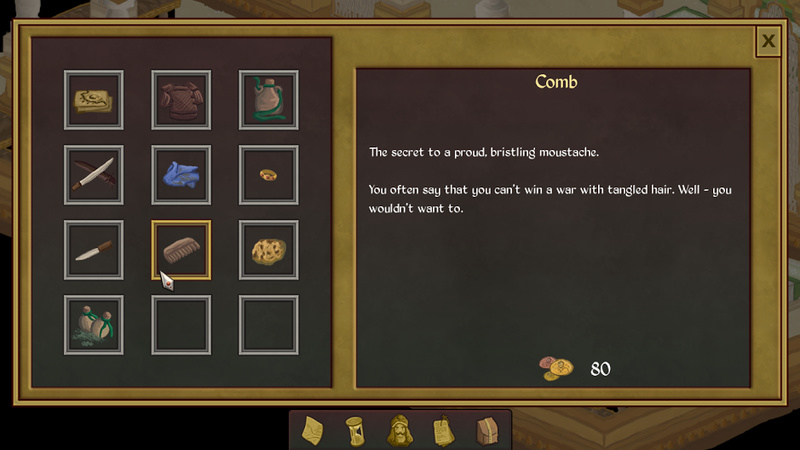
The game also has a traits system, that track aspects of your characters' personalities as you make choices throughout the story. For instance, your character might develop a loyalty trait for trying to take care of those working for him. From what I've seen, the traits do not seem to have a huge impact on the game, but instead function as "souvenirs" or achievements that illustrate some of the decisions you have made. Maybe I missed something, and maybe the traits do affect dialogue choices instead of being mere tokens, but I honestly did not notice a difference through two playthroughs. Also, these traits do not always carry forward. For example, I lost most of the traits gained for the princess between the second and third segments of her story. I'm not sure why the decision to do that was made, since the trauma she suffered in the second segment should have colored her personality in the third. The in-game help menu is light on details, and the game did not come with an instruction manual, so again I could be wrong about how little the traits seemed to matter, but if I am right, it seems like a lost opportunity to add complexity to the game.
VioletShadow: Except for the situations Deuce describes, I also could not find a use for the inventory items. Such a shame! Some of those items were interesting and seemed to have a backstory, so I was very disappointed that there was nothing I could do with most of them. As for traits, in my two playthroughs I didn't notice them having any impact, besides showing that the character had chosen to act one way or another. It is a nice feature, but feels underdeveloped.
Deuce Traveler: Finally, there are some major decisions you can make in the game that seem to have little effect on the overall story. In one playthrough, I decided that I was going to put my character in harm's way for the sake of diplomatic niceties. That character was killed. On the second playthrough I decided to be especially conceding during the diplomatic discussions, but then rigidly refused a request for my character to put himself in harm's way. This caused my character to step down from her diplomatic station and retire. In the character's narrative this made a huge difference, since she was now alive rather than dead. But from my perspective as a player the result was the same, since the character would have no further impact on how the story unfolded.
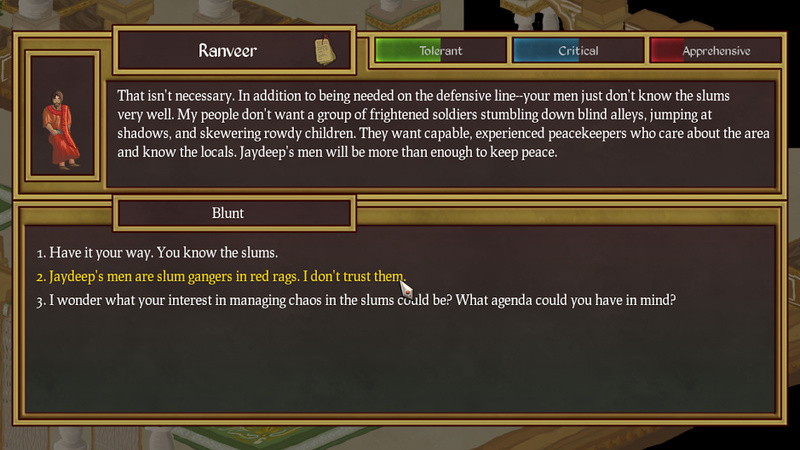
Graphics and Sound
I should be happy that the gameplay was so simplified, since my laptop's Intel graphics card was incompatible with the game, causing clipping and horrible smearing in the vast majority of the maps. This nearly rendered the game unplayable for me, but I was able to move towards blobs that looked more or less like people and engage them in conversation. According to the programmer, Mr. Yadav, this graphical incompatibility problem should be fixed by the time the game is published.
In the few area maps where the graphics didn't smear on me, I could see that the game's characters and landscapes were based on hand drawn renderings. The colors in the background art can be quite vivid, with the green trees and the blue water appearing bright against the beige contrast of dirt-packed streets and the decrepit buildings of the poor. On the other hand, the characters' cartoony style is a bit silly when contrasted with the game's dark plot. While their appearance isn't exactly bad, I would rate them as merely serviceable.
I trust VioletShadow's taste in game music more than my own, but I will say that I found the music added to the atmosphere of the game, with its eastern melodies. I never felt the urge to disable it. On the other hand, it just became ambient noise to me after a while and I can't say any one tune really left me with a lasting impression.
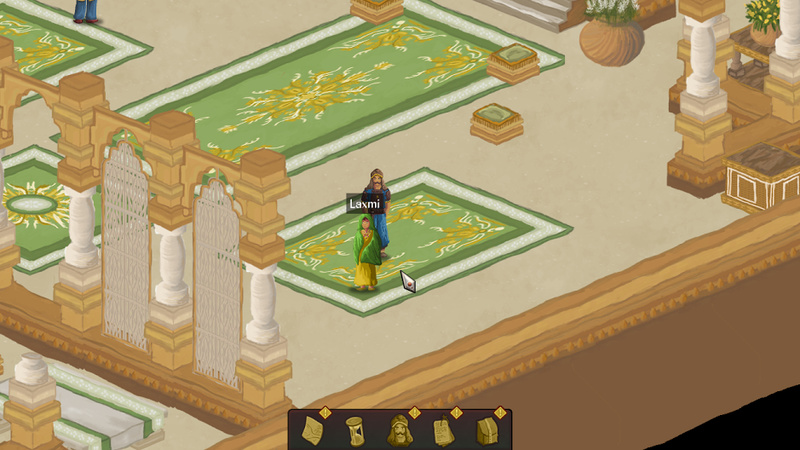
VioletShadow: Thankfully, no graphical problems for me! I enjoyed both the art and sound, as there was a high degree of thematic coherence in the architecture, clothing, landscapes and music. The soundtracks from the second half of the game were more memorable to me compared to those in its first few segments, but overall they were all pleasantly subdued. Together, they created the appropriate atmospheres for the various areas of the city, the depressing slums contrasting with the wealthier quarters where the merchants and nobles live.
Conclusion
Deuce Traveler: Unrest is an adventure game lacking in puzzles, but strong in plot. The story is well told and there is some replay value in trying its different paths. It is, however, quite short, and can be finished in just a few hours. For those expecting an RPG that simulates some of the statistically light storyteller-type tabletop games like Amber and In a Wicked Age, I am afraid you won't find that here.
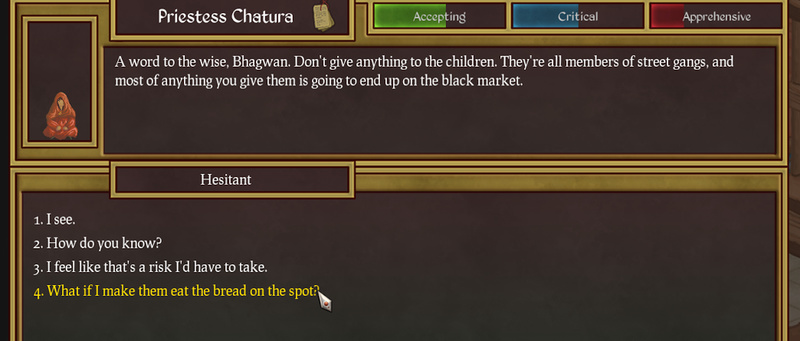
Ultimately, I think this game is going to be a point of debate on the Codex due to the high hopes some members may have held for it. The game will probably be enjoyable for those who haven't been following its development or the hype surrounding it, but I think that those who have been looking forward to it for some time will be a little disappointed that its decision paths aren't more complex. For my part, I found it enjoyable enough, but it's not something that I would put on a list of highly recommended games.

Deuce Traveler: Unrest is an indie adventure game, labelled by its creators as an "adventure RPG", and available on Steam and GOG. It was Kickstarted last year by Pyrodactyl Games, a small developer led by programmer Arvind Raja Yadav. Prior to this game, Mr. Yadav also spearheaded the creation of two other small indie games: Will Fight for Food and The A.Typical RPG. The story of Unrest is based on Indian history and myth, focusing on fictional events surrounding the fate of the city of Bhimra. Something I found out while researching the game is that there actually is an Indian city of Bhimra, so in some ways fact meets fiction in this adventure.
Story
The city of Bhimra has been suffering a continuous drought for years. The drought has destroyed the local economy, resulting in a large urban population unable to feed itself. Although the majority of the population in the city and its surrounding areas have been able to make do despite tightened belts, many people have lost everything, retreating into the city's already burgeoning slums. Because of this, the royal family has decided to sign a treaty with the distrusted naga race. The king and queen have agreed to allow an influx of naga immigration into the city in return for agricultural trade which will feed its hungry population. The unemployed people of the slums are violently opposed to this idea, as bringing in foreigners in will worsen their unemployment. The human merchants are also opposed to the treaty, since they will lose their monopoly on the food market. Riots erupt, causing increased animosity between the people of the slums, the better off citizens of Bhimra, and the newly arrived naga.

The game begins with you playing as the naïve princess of Bhimra and becoming familiar with the internal politics of the game world. However, the storyline is actually divided into several segments, with a different protagonist coming to the fore with each transition. As the story progresses, you will view the unrest of Bhimra through the eyes of the princess, a naga, a peasant, a priest, and a warrior, whose personalities are fleshed out via appropriate dialogue options. It's important to note that many of the game's events are going to happen regardless of the characters' actions. For instance, nothing the characters can do will stop the angry rioting of the hungry, or the drought that is destroying the economy. The best the player can do is try to steer events towards a favorable outcome. I very much like this aspect of the game, as you quickly learn that you cannot solve the problems you face with the swing of a weapon or the casting of a spell. You will often find yourself feeling helpless in the face of events beyond your control, and that vulnerability translates into how you approach other in-game characters.
VioletShadow: The concept of seeing the Bhimra's unrest through the eyes of several different main characters worked very well. Not only were the individual segments intertwined in terms of their actions and consequences, but the personal perspective of each of them served to ground the world and make it feel very lived-in. Some of my favorite segments were the ones that involved the peasant. Even though she was only loosely connected to the main plot, her story and the circumstances she found herself in helped illustrate the disconnect between the lower castes and those at the top. Her immediate preoccupations, and those of the other peasants, involved problems directly related to their status in society, such as lack of food and the need to marry into higher castes, rather than political instability or the trade treaty, which for the most part they hadn't even heard of. It made me think of how the isolation of the lower castes created the conditions for problems such as the slums' rioting. This ties into your point regarding events outside the characters' control. Looking back to the segment with the naga, I felt a strong sense of helplessness; there was really nothing she could do to make the situation better. I agree that it made the game world believable, and a much more immersive experience than if some chosen one could erase history and its consequences with eye-rolling heroics.

Deuce Traveler: The world of Unrest is certainly a kind of medieval fantasy setting, but different enough to interest players tired of the all-too-familiar pseudo-European fare. The architecture is eastern, as is the dress of the people. The culture is post-Gupta Indian, featuring an entrenched caste system and Hinduism with nary a hint of Buddhism or Islam. The game's story fleshes out the motivations of its various characters, including the villains, who believe that they were right for making the bloody decisions that propel the plot, despite the catastrophic results. This is not a story of noble heroes pushing back darkness, but instead a tale of survivors with opposing viewpoints going through their lives, which are interrupted on occasion by short outbursts of charity or wickedness.
VioletShadow: This is definitively a tale of "playing the hand you are dealt", which should be enjoyable to players who have grown tired of going through games as either idealistic simpletons or mass-murdering maniacs. As Deuce mentions, even villains and antagonists have believable reasons for the things they do, and players might even find themselves sympathizing with some of them. Unrest is about survival in many ways, and I enjoyed how no matter which path you have your character take, that theme will always be illustrated throughout the game.
Gameplay
Deuce Traveler: Right off the bat, you have two difficulty options to choose from: Myth and Mortal. Myth mode is considered easier since it allows you to use multiple save slots. Mortal is considered an "Iron Man" mode, because it limits you to one save. Other than that, there is little difference between the two, and you can still save scum in Mortal mode with the one save slot. All things considered, the designer should have saved himself some time, dropped the idea of difficulty levels, and put his efforts into lengthening the game instead.

There is no character creation, no skill trees, no ability scores, and no leveling system. You do play character roles, and the discussions you have with others can take you down different paths of the story. In my opinion, this does not make the game an RPG, any more than the branching conversation paths of Wing Commander III and IV make those games RPGs. I would call Unrest a fantasy relationship simulator. The objective is to walk from point to point, talk to people and sway them into aiding you. The maps are small, so backtracking isn't painful, although I did notice that my character inexplicably walked slower on some surfaces, such as rugs.

When you enter into dialogue with another person you will see three different meters. The first is a green friendship meter, which shows whether that person is hostile or friendly. The second meter is blue, and indicates how much respect the person has for the protagonist. The third meter is red and indicates fear. You can use dialogue to change how people perceive your character, from alienating people who might be friends, to talking down someone who intended to attack. You can fail at a conversation, which will permanently lock you out of its dialogue trees. In one part of the game I was helping out a naga, but I accidentally offended him and therefore he would not aid my character in her attempt to escape her village. A successful conversation can sway someone to your side, while a failed conversation can lead to violence. This won't matter much in the beginning of the game when everyone is on friendly terms, but you will want to choose your words carefully when the inevitable feces strikes the twirling rotary blades.

When conversations do go bad, the player will find his character in combat on a two dimensional field, standing opposite his or her enemy. Fighting is a simplified affair with two buttons that allow striking and blocking. Each side has several "damage tokens" that represent a hit points system. A successful strike results in the character hit losing a single token, with the character being killed once he or she has run out of tokens. Usually anyone engaging your character will be better armed, so you really want to avoid combat when you can. Sometimes the game avoids combat for you, such as one time when a warrior I was playing was surrounded by several enemies. Instead of throwing down my sword, I decided to try to take one of the bastards with me, but this resulted in a screen that detailed my death instead of actually letting me fight it out. That was kind of a shame since out of all the characters in the game, the warrior was the only one trained and equipped to actually win a match.
VioletShadow: Alright DT, you explained these gameplay elements very well and there's no need for me to add anything except confirm that it is possible to finish the game for the first time without any combat... so, interested parties out there, yes, a non-combat playthrough is totally viable... and advisable!
Deuce Traveler: There is an inventory system in the game, but I never found any situation where I had to use an item on something or pick up an item off the ground. Sometimes people will give your character an item in conversation, and you can then give that item to someone else in a subsequent conversation. The only exception to this rule is weapons, which appear in your hand in the battle screen, and some books you can find, which just add snippets of quotes into your journal. Your character will also often start a segment with a number of items in his inventory, but these seem to be mainly cosmetic.

The game also has a traits system, that track aspects of your characters' personalities as you make choices throughout the story. For instance, your character might develop a loyalty trait for trying to take care of those working for him. From what I've seen, the traits do not seem to have a huge impact on the game, but instead function as "souvenirs" or achievements that illustrate some of the decisions you have made. Maybe I missed something, and maybe the traits do affect dialogue choices instead of being mere tokens, but I honestly did not notice a difference through two playthroughs. Also, these traits do not always carry forward. For example, I lost most of the traits gained for the princess between the second and third segments of her story. I'm not sure why the decision to do that was made, since the trauma she suffered in the second segment should have colored her personality in the third. The in-game help menu is light on details, and the game did not come with an instruction manual, so again I could be wrong about how little the traits seemed to matter, but if I am right, it seems like a lost opportunity to add complexity to the game.
VioletShadow: Except for the situations Deuce describes, I also could not find a use for the inventory items. Such a shame! Some of those items were interesting and seemed to have a backstory, so I was very disappointed that there was nothing I could do with most of them. As for traits, in my two playthroughs I didn't notice them having any impact, besides showing that the character had chosen to act one way or another. It is a nice feature, but feels underdeveloped.
Deuce Traveler: Finally, there are some major decisions you can make in the game that seem to have little effect on the overall story. In one playthrough, I decided that I was going to put my character in harm's way for the sake of diplomatic niceties. That character was killed. On the second playthrough I decided to be especially conceding during the diplomatic discussions, but then rigidly refused a request for my character to put himself in harm's way. This caused my character to step down from her diplomatic station and retire. In the character's narrative this made a huge difference, since she was now alive rather than dead. But from my perspective as a player the result was the same, since the character would have no further impact on how the story unfolded.

Graphics and Sound
I should be happy that the gameplay was so simplified, since my laptop's Intel graphics card was incompatible with the game, causing clipping and horrible smearing in the vast majority of the maps. This nearly rendered the game unplayable for me, but I was able to move towards blobs that looked more or less like people and engage them in conversation. According to the programmer, Mr. Yadav, this graphical incompatibility problem should be fixed by the time the game is published.
In the few area maps where the graphics didn't smear on me, I could see that the game's characters and landscapes were based on hand drawn renderings. The colors in the background art can be quite vivid, with the green trees and the blue water appearing bright against the beige contrast of dirt-packed streets and the decrepit buildings of the poor. On the other hand, the characters' cartoony style is a bit silly when contrasted with the game's dark plot. While their appearance isn't exactly bad, I would rate them as merely serviceable.
I trust VioletShadow's taste in game music more than my own, but I will say that I found the music added to the atmosphere of the game, with its eastern melodies. I never felt the urge to disable it. On the other hand, it just became ambient noise to me after a while and I can't say any one tune really left me with a lasting impression.

VioletShadow: Thankfully, no graphical problems for me! I enjoyed both the art and sound, as there was a high degree of thematic coherence in the architecture, clothing, landscapes and music. The soundtracks from the second half of the game were more memorable to me compared to those in its first few segments, but overall they were all pleasantly subdued. Together, they created the appropriate atmospheres for the various areas of the city, the depressing slums contrasting with the wealthier quarters where the merchants and nobles live.
Conclusion
Deuce Traveler: Unrest is an adventure game lacking in puzzles, but strong in plot. The story is well told and there is some replay value in trying its different paths. It is, however, quite short, and can be finished in just a few hours. For those expecting an RPG that simulates some of the statistically light storyteller-type tabletop games like Amber and In a Wicked Age, I am afraid you won't find that here.

Ultimately, I think this game is going to be a point of debate on the Codex due to the high hopes some members may have held for it. The game will probably be enjoyable for those who haven't been following its development or the hype surrounding it, but I think that those who have been looking forward to it for some time will be a little disappointed that its decision paths aren't more complex. For my part, I found it enjoyable enough, but it's not something that I would put on a list of highly recommended games.











